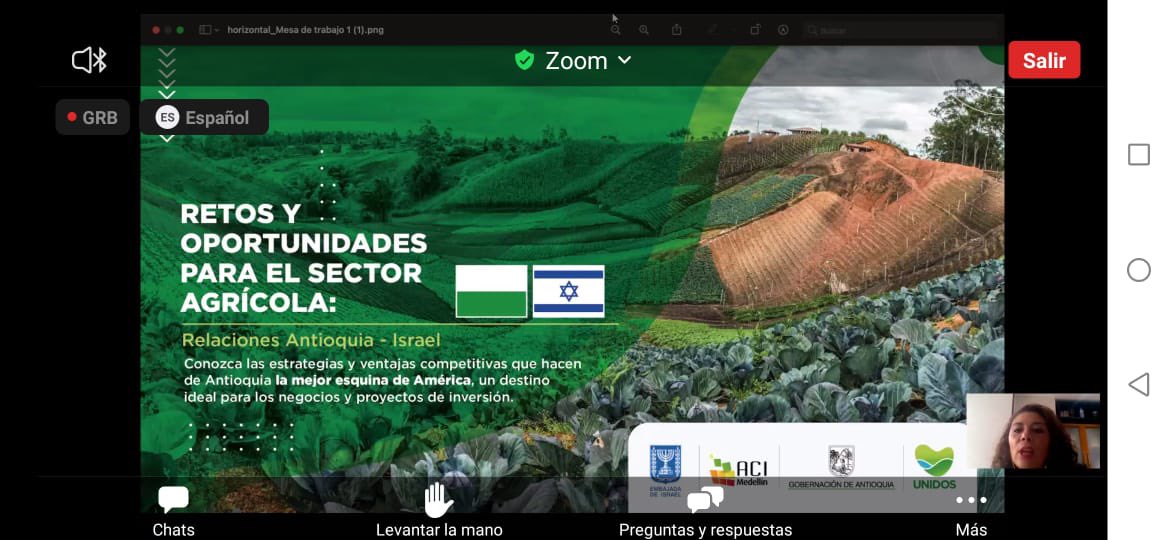Due to its privileged geographic location, tax incentives, competitive infrastructure and high economic performance, among other virtues, the so-called “Corner of the Americas”, Antioquia, is positioned as one of the most attractive destinations for foreign direct investment to settle .
Antioquia has about 13% of the total Colombian population (around 6.5 million inhabitants) and a contribution of 14.5% of the country’s Gross Domestic Product (153,518 billion pesos).
According to the Agency for Cooperation and Investment of Medellín and the Metropolitan Area – ACI Medellín, 265 investment projects have been executed since 2008, mainly from Chile, China, Spain, the United States, France and Mexico, among others, reporting 3,041 million Dollars.
It is a region with great investment possibilities for agribusiness, extractive industries, life sciences, manufacturing and services
Foreign companies such as Globant (Argentina), Farmacielo (Canada), MRO Avianca (Brazil), Grupo Sodimac (Chile), Valver (Spain), Avenger Fligth Group (United States), HWI – Haceb joint venture – Whirlpool (United States – Colombia ), Mane (France), One Link (Guatemala), Mitsubishi Electric (Japan), Incolmotos Yamaha (Japan), Airplan (Mexico), Mera Corporation (Mexico), Sana Commerce (Netherlands) and Westfalia (South Africa), have believed in the potential of the territory.
Antioquia offers for investment its high economic performance, access to competitive infrastructure, tax incentives for investment, abundant human talent with relevant training, and its quality of life, which makes it an excellent place to work and live.
In this regard, the governor of Antioquia, Aníbal Gaviria Correa, emphasized that: “as well as their business class and leader, all Antioqueños are people with capacity, talent, creativity and passion; without a doubt, human resources are the most important competitive factor in our department and the invitation to invest in the territory”.
Antioquia differs from other regions of Colombia for being the country’s most exporting department (close to 20% in 2019) and having a vibrant innovation ecosystem.
The government’s commitment to attracting foreign direct investment in the territory is mainly concentrated in sectors and economic activities in which Antioquia today has the skills to compete in the international markets, these sectors are:
- Agricultural in the cultivation of hass avocado, cocoa, citrus, among others.
- Livestock in the production of beef.
- Life sciences with the production of cannabis for medicinal purposes.
- Miner – energetic with gold mining.
- Services in the development of software and applications, and the outsourcing of services: PBO, KPO, ITO.
- Specialized manufacturing such as motion and associated industries.
- Infrastructure and logistics.
“For ACI Medellín, expanding the vision of the Antioquia territory has been one of the key factors in the exercise of identifying the reasons that make us attractive for foreign direct investment. We are proud to see that we have so much to offer and that our biodiversity, geographic position, climatic situation, and population and cultural wealth make us a privileged environment for investors to prosper, “said Eleonora Betancur González, executive director of the Cooperation Agency and Investment of Medellín and the Metropolitan Area – ACI Medellín.
The commitment of the Government of Antioquia and the ACI Medellín is clear: to make investors fall in love with a fertile territory with great investment opportunities for agribusiness, extractive industries, life sciences, manufacturing and services; but, above all, that with the arrival of these companies, development is generated for the territory and its inhabitants.
What does Antioquia offer in terms of investment?
- High economic performance
The Departmental Competitiveness Index has classified Antioquia for 7 consecutive years as the second most competitive department in the country, due to diversification in the labor market and the adoption of Information and Communication Technologies – ICT in the business and industrial ecosystem . It stands out for presenting growth rates higher than the global average of the Colombian economy. Its business structure is diverse and at the same time specialized in the niches in which it operates.
- Access to competitive infrastructure
The Antioquia territory has an ideal geographic location for import and export operations. Antioquia is considered “the corner of the Americas” because it connects the central and northern areas of the continent with South America. Thanks to the network of free trade agreements, Colombia provides access to about 60 countries with more than 1.5 billion consumers.
The construction of Puerto Antioquia and the Fourth Generation (4G) highways are planned, which will allow better land and port connectivity, and will offer competitive advantages by facilitating import and export, making the value chains of the installed investments more efficient .
- Tax incentives for investment
To promote economic development and job creation through the installation of new companies in the territory, different Antioquia municipalities contemplate tax incentives related to property, industry and trade taxes, as well as the complementary of notices and boards. The subregions of Oriente and Urabá stand out, as they have tax incentives that offer the possibility of having a 100% exemption on property and industry and commerce taxes during the first years of operation and a subsequent progressive discount. In addition, 55 municipalities in the department have a benefit in the special progressive rate of income tax until the year 2027.
It is important to note that Antioquia has 3 Permanent Free Zones, territories where important tax benefits are obtained for the companies established there.
- Well-trained and qualified human talent
Human talent is one of the most sought after resources in the department. 61% of the Antioquia population is of economically active age and 33% of the population is young, between 20 and 39 years old. Antioquia is the department with the second highest number of higher education graduates in Colombia, between 2001 and 2018 the total number of undergraduate and postgraduate graduates in Antioquia totaled 552 thousand people, which represents 13% of the total graduates in the country.
- Quality of life
Indicators such as the decrease in extreme monetary poverty, which in the last 15 years went from 17.8% to 5.6%, coverage of 98% of the inhabitants in the general social security system in health, access to 98.8% to the electric power service and 90.6% to the aqueduct service, are some of the advances of the social policies of the country and the department to improve the quality of life of the inhabitants.



































